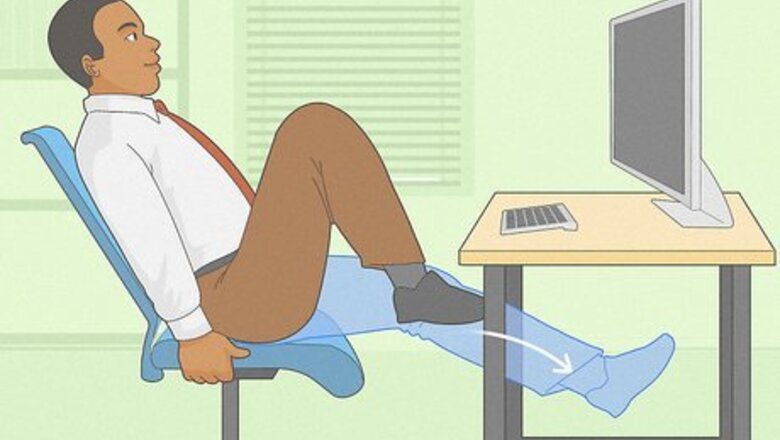
views
- Burn calories while sitting by exercising your core and glute muscles or doing desk yoga.
- Drink caffeine—including coffee and green tea—to boost your metabolism, increase energy, and promote weight loss.
- Eat a diet rich in fibre and capsaicin to promote fullness and give you a burst of energy.
Do knee ups.
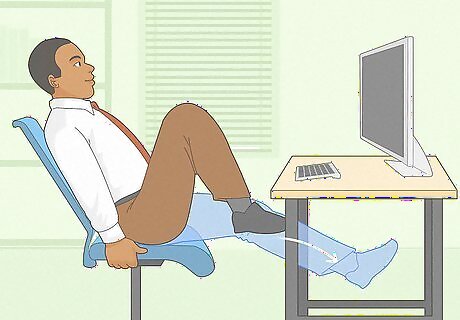
Exercise your core muscles by doing knee ups under your desk. Lean back in your chair and lift your feet off the floor so that your legs are at a 45-degree angle beneath your desk. To do one rep, quickly bend one knee towards your chest, and then extend it fully again to the starting position while bending the other knee. Do 3 sets of 20 reps each to burn around a hundred calories, give or take, depending on your body type and how quickly you move. It's easy to lose your balance doing this exercise. If you need a little stability, rest your arms on your desk or hold onto your chair's arms if it has any.
Engage your stomach muscles.
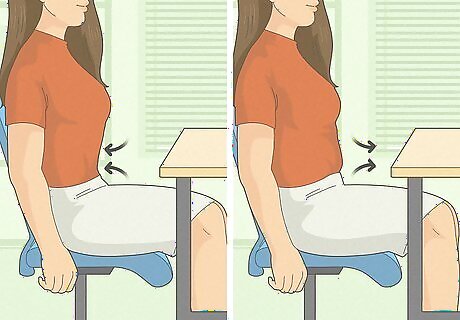
Squeeze your stomach muscles together for a quick and effective exercise. You can get a good workout in just sitting at your desk simply by flexing your abdominal muscles over and over again. Engage your stomach muscles as tightly as you can and hold for 8 seconds before releasing. Do this 8 times, twice a day, to burn about 100 calories.
Do desk yoga.
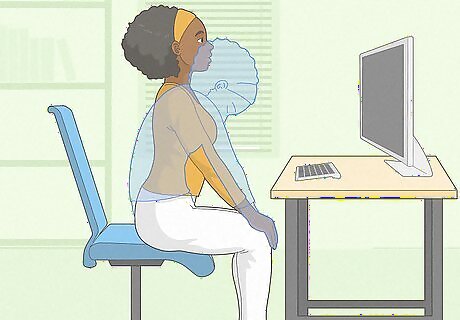
A good stretch several times a day will keep you energized. Sitting at a desk all day can really take a toll on your body, but doing yoga is a great way to refresh you and even burn a few calories. It's also a great way to reduce stress, which may prevent you from over-eating while you work. To do a half-moon pose at your desk, square your shoulders and hips. Stretch your left arm up above your head, extending it to its full length, while you extend your right arm out to the side and lean your upper body toward that side. Hold for 1 minute, slowly inhaling and exhaling the whole time, and then do the same pose with your other side. A desk cat-cow stretch will help relieve tension in your upper back, shoulders, and neck. To do a cat-cow at your desk, start with both feet flat on the floor and put your hands on your knees. Arch your back so you're facing the ceiling, inhaling as you do so. Then, exhale while rounding your spine and allowing your head to drop forward. Repeat this for 3 to 5 breaths.
Engage your buttocks.

Work your butt muscles in your desk chair for a fast and discrete workout. It’s all about the booty! You can exercise your buttocks from your desk easily. While sitting in your chair, engage your glute muscles and hold for 5 seconds before releasing. Do this 10 times twice a day. To turn up the heat a little, try squatting just above your seat to burn calories. Plant your feet about shoulder-width apart and, keeping your back straight, raise your butt off the seat about an inch. Count to 10 before lowering. Try to do this 10 times a day.
Maintain good posture.
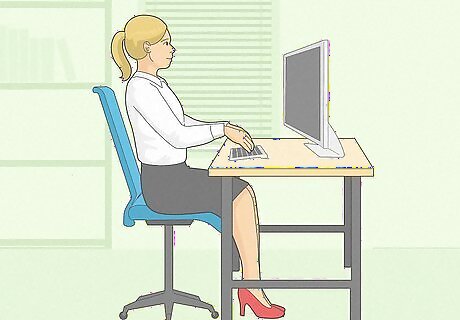
Good posture engages your upper body muscles, which burns calories. If you’re a chronic sloucher (we can relate!), practice maintaining better posture to strengthen your upper body, shoulders, and back muscles. Exerting the energy required to hold your posture will help you burn calories. To maintain good posture, be sure your computer monitor is at eye level. Sit with both feet on the ground and your knees at or above hip level. Opt for a chair that offers good lumbar support, or try a stability ball to help you practice your balance and develop core muscles.
Turn down the heat.
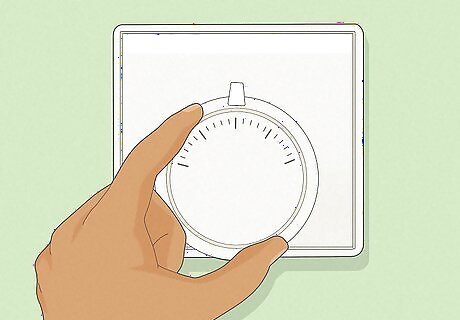
Your body burns calories trying to stay warm. If you’re comfortable with the temperature in your workspace, try turning the thermostat down a few notches. Your body uses energy trying to warm up, so knocking the temp down a couple of degrees is one way to burn calories at your desk. If you work in an office where you can’t control the temperature, try cooling down by wearing fewer layers to work, drinking cold beverages, or applying cold items (like an ice pack) to the parts of your body where your veins are closest to the surface (like your wrists, neck, and temples).
Fidget.

Fidgeting gets a bad rap, but it can help you burn hundreds of calories. If you’re prone to shifting in your seat, tapping your toes, squirming, stretching, or any of the hundreds of other ways there are to fidget, keep it up. Movement of any sort helps you stay energized and burn calories: depending on how much you fidget and the type of fidgeting, you could burn 5 to 6 times more calories than you would sitting still. If you're a gum-chewer, keep on chewing: studies suggest you could burn about 11 calories an hour chewing gum, which may not sound like much, but it can add up over a day. Plus, gum acts as an appetite suppressant, so you'll be less likely to snack while you're chewing, saving you some extra calories that way.
Laugh more often.

A laugh a day keeps the calories away. Laughing isn’t just fun—it also engages your core muscles and can help you burn calories. It’s not likely to burn a lot—maybe about 40 for 10 to 15 minutes of laughter—but it adds up! Next time you need a break from your work, don’t scroll social media mindlessly: watch a video of your favorite comedian, or seek out your funniest coworker for a giggle.
Dance at your desk.
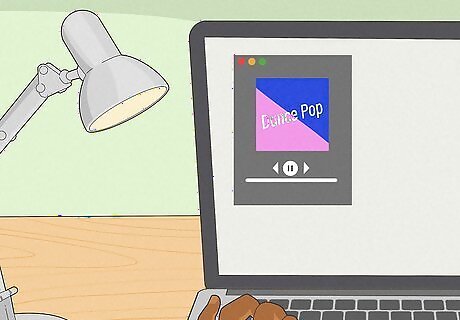
Throw on some upbeat, energizing music to keep you grooving. A dance party is one of the most fun ways to shed calories, and it’s something you can do anywhere as long as you have a good beat to move to. Take a break every hour or so to listen to an upbeat song at your desk to burn around a hundred calories. Upbeat music will decrease hunger and boost your mood, making you less likely to overeat due to stress. If you work in an office with other people, throw on some headphones and play your favorite upbeat songs for a few minutes of dancing—or invite everyone in the office to participate in 5-minute daily desk dance parties. Working out with others will not only make the process more fun, but the accountability will make it easier to stick with your workout routine.
Stay hydrated.
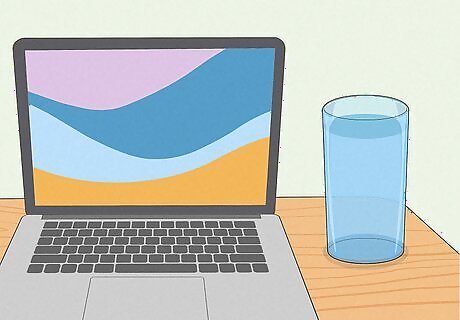
Boost your metabolism by drinking plenty of water. Drinking enough water throughout the day keeps you energized and it reduces hunger, making you less likely to snack—in fact, dehydration often presents as hunger, so next time you feel like snacking, you may really just be thirsty. Try to drink about 15.5 cups (3.7 liters) of fluids a day if you’re a man, or 11.5 cups (2.7 liters) of fluids a day if you’re a woman. Your water intake doesn’t have to be solely water, either: if you’re not a fan of the flavor (or lack thereof) of plain water, add some sugar-free flavoring, or get a little hydration by drinking unsweetened tea or coffee. Keep in mind that a lot of fruits and vegetables contain water as well, so you can boost your hydration by eating the right foods: spinach and watermelon, for example, are almost 100% water.
Drink caffeine.
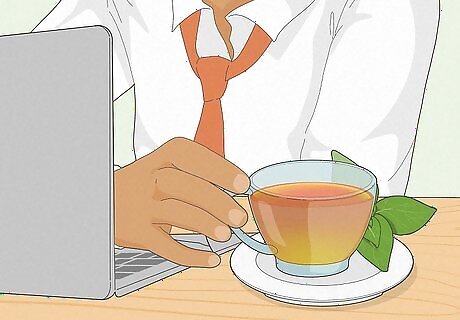
Whether coffee or tea is your go-to, caffeine can help you shed calories. Both coffee and green tea contain caffeine and catechins—antioxidants that interact with caffeine to boost your metabolism, which makes it easier to burn calories. The caffeine will also give you more energy to do exercises at your desk. Green tea is also a good source of theanine, an amino acid that promotes calmness and alleviates anxiety—which may help prevent mindless snacking or overeating due to stress.
Eat spicy foods.
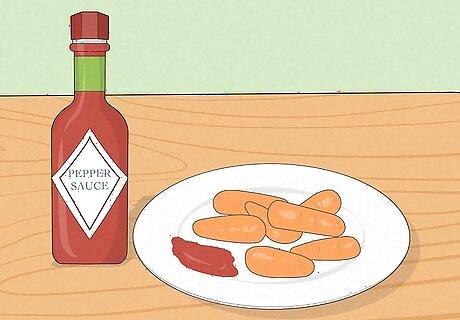
Add a little kick to your lunch to break down fat and boost your energy. Capsaicin, the compound that gives spicy peppers their fire, has been shown to boost the body’s ability to burn fat and increase energy. So add a sprinkle of cayenne pepper to your popcorn or dip your baby carrots in hot sauce for an added zing that’ll keep you awake and help you burn some extra calories. Capsaicin also decreases your appetite by sending signals to the hypothalamus—the part of your brain that decides if you’re hungry or not—that you’re full. So the more spicy foods you snack on, the less likely you are to overeat.
Snack on high-fiber foods.

Fiber is harder to digest, which will help you burn calories. Your body burns calories digesting food, and since fiber is difficult to digest, you’ll burn more calories eating high-fiber snacks. Moreover, foods high in fiber—especially viscous fiber—will decrease your appetite, making you less likely to overeat. Viscous fiber refers to fiber with a higher viscosity. The higher the viscosity, the longer the food will sit in your gut, keeping you fuller longer. Opt for chickpeas, beans, lentils, and peas for a filling, fibrous snack.




















Comments
0 comment